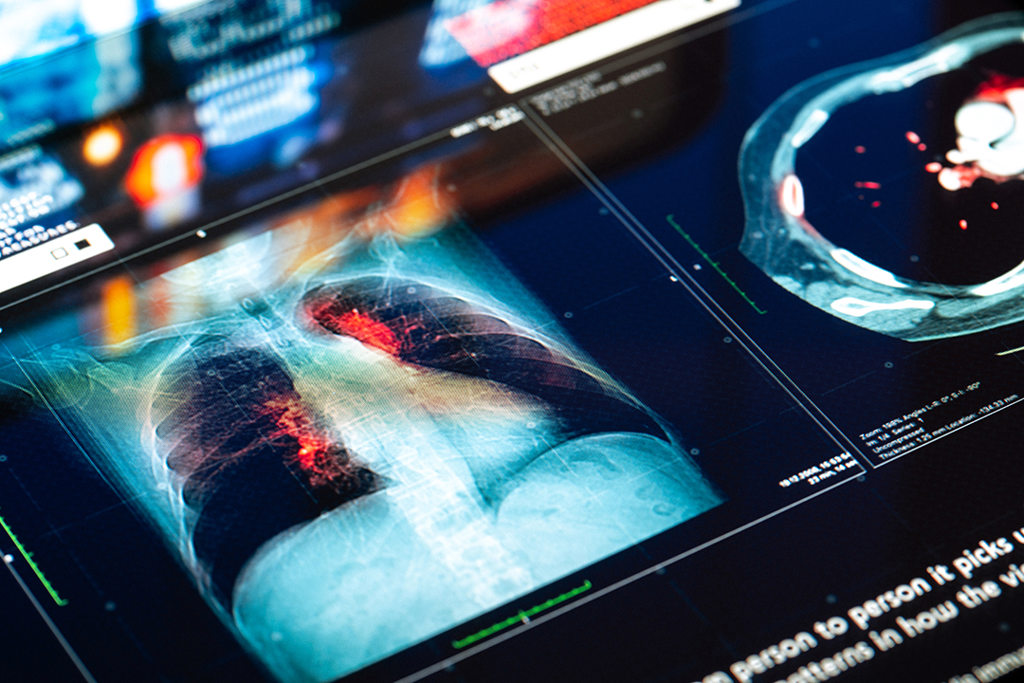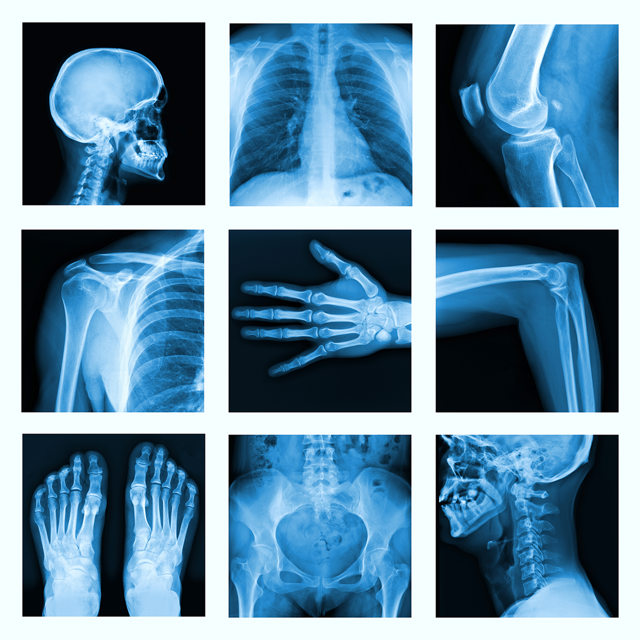
Nuclear Medicine
The Nuclear Medicine services at Penn Highlands are accredited by the American College of Radiology (ACR) to perform and interpret Nuclear Medicine exams. Penn Highlands performs heart, gallbladder, renal, lung, thyroid, and bone scan studies. Nuclear medicine uses a small amount of radioisotope administered in several ways: injection, IV, capsule or inhalation. The isotope travels to the "target" organ and tissues and provides images of the organ to be interpreted by the radiologist.
Instructions for your Nuclear Medicine Study
Nuclear Medicine uses a small amount of radioactive material to diagnose disease. It can provide accurate images that help technologists and physicians study the body's internal organs and tissues. It can also help detect cancer, heart disease, arthritis, fractures, and infection.
Nuclear Medicine studies are safe and have the same risk as a common x-ray. The studies use small amounts of short-lived radioactive materials that pass out of the body within 24 hours. Other than the slight discomfort of a needle stick, the studies are painless.
Prior to having your Nuclear Medicine study, you will be administered an isotope through an injection, IV, capsules, special tubing, or inhalation. The isotope then travels to target organs and tissues and gives off gamma rays. These rays are a form of radiation that can be seen only with special equipment.
The equipment takes images of the target organs and tissues which are then read by your radiologist. The radiologist will send a report your physician after the exam.
How should I prepare for my study?
Nuclear Medicine studies vary in preparation requirements and are often very different. Please discuss your exam with your physician and follow the instructions that correspond to the study that is ordered for you. For any of the following studies, you should bring previous x-rays or medical information to your study to assure the most accurate results.
You should inform your physician or technologist if you are or might be pregnant or breastfeeding. You should inform them of any vitamins, herbs, or medications that you are taking. You may be required to wear a gown during your exam and should leave all jewelry and valuable items at home.
Blood Loss Scan:
Blood Loss scans help determine whether you have internal bleeding and where it is occurring.
Preparation: None
Procedure: The patient has blood drawn which is then mixed with an agent that tags red blood cells and is mixed with an isotope. The mixture is injected back into the patient's body. The patient is scanned three times - once initially, and again at 8 and 24 hours. Scan Time: The first scan lasts for one hour and the last two scans last for approximately 15 minutes.
Bone Scan:
Bone scans are used to determine whether the patient has abnormalities of his or her bones and often are used to detect fractures, arthritis, Paget's disease, bone tumors, infections, Fibrous Dysplasia, impaired bone blood supply, or unexplained bone pain.
Preparation: None
Procedure: The patient will receive an isotope through an injection and will return to the Radiology Department 3 hours later for scanning. Scan Time: 45 minutes
Cardiolite Stress Test:
A Cardiolite Stress Test takes images of your heart muscles and arteries while exercising.
Preparation
- Do not drink any beverages containing caffeine 24 hours before the test.
- Do not drink any decaffeinated beverages 24 hours before the test.
- Do not eat or drink chocolate foods or drinks 24 hours before the test.
- Do not take any medications containing caffeine (Excedrin, Anacin, Midol) 24 hours before your test.
- Hold blood pressure medicine if it is a Beta Blocker such as Atenolol, Metoprolol, etc., 24 hours before the test. You should bring it with you to your test so you can take it immediately afterwards.
- No smoking 6 hours before your test.
Procedure: The patient arrives in the Radiology Department and is given an IV. The isotope is administered through the IV with a waiting time of 45 minutes before scanning. The patient is then escorted to the Cardiopulmonary Department, where he or she will exercise on a treadmill. Toward the end of the test, another injection of Cardiolite will be given. (There are not any side effects from Cardiolite). The patient will be brought back to the Radiology Department and scanned again. Scan Time: 2-3 hours
Persantine Cardiolite Stress Test:
A Persantine Cardiolite Stress Test is used if the patient is not able to reach 85% of their maximum predicted heart rate for age by walking on the treadmill. The technologist will administer Persantine, which will stress the patient medically.
Many patients have Persantine studies because they have:
- had surgeries that inhibit walking
- arthritis that has debilitated their walking performance
- neurological problems
- obesity
- lung problems
- peripheral vascular disease
- poor general physical condition
- an inability to comprehend the exercise program
Preparation:
- Hold Theophylline medication for 48 hours prior to your test.
- Do not drink, eat, or take any medications containing caffeine for 24 hours prior to your exam.
- No smoking the morning of the exam.
- Do not eat breakfast the morning of your exam.
Procedure: You will be injected with the tracer and scanned 45 minutes later with your heart beating at a resting pace. Persantine will be injected with the tracer and scanned 45 minutes later with your heart beating a resting pace. Persantine will be injected into your body through an IV for approximately 4 minutes. Five minutes later, the radioactive tracer will be injected into your body through the same vein. After the Persantine and tracer move throughout your body for about an hour, another set of pictures will be taken. Inform your physician or technologist immediately if you experience side effects during or after your Persantine Cardiolite Stress Test. Scan Time: 2-3 hours
Gastric Emptying Scan:
The Gastric Emptying Scan allows physicians to identify abnormalities in the emptying of the stomach.
Preparation: Patient should fast for 12 hours prior to the scan.
Procedure: The patient eats an egg that is mixed with the isotope, which evaluates if the stomach empties correctly. Scan Time: 2.5 hours
HIDA Scan (Gallbladder):
Hepatobiliary Iminodiacetic Acid (HIDA) Scans are used to evaluate the function of the gallbladder and bile ducts. This scan is often used to determine whether there is an obstruction to the bile ducts, disease of the gallbladder, and bile leaks.
Preparation: Patient must fast for at least four hours prior the exam.
Procedure: An initial injection evaluates gallbladder function. The exam may have an additional part called an EF, which is an additional injection to measure the amount of gallbladder emptying. Scan Time: Four hours if the gallbladder does not fill.
Liver Scan:
Liver scans assess the function of the liver and identifies certain conditions such as cancer, tumors, cirrhosis, and hepatitis.
Preparation: None
Procedure: The isotope is administered by an injection and images are taken of the liver. Scan Time: 1.5 hours
Lung Scan:
Lung scans look at the flow of air and blood into your lungs. It helps diagnose shortness of breath, chest pain, blood clots, or chronic obstructive airways disease.
Preparation: Bring any chest x-rays done previously with you.
Procedure: the study has two parts. In the first part, the patient inhales the isotope through a breathing apparatus and is then scanned. The second part is an injection to check blood flow to the lungs. Scan Time: 1 hour
MUGA Scan (Gated Heart):
The MUGA Scan assesses the function of the heart and the pumping function of the ventricles.
Preparation: None
Procedure: The patient has blood drawn which is mixed with an agent that tags to the red blood cells. The mixture is injected back into the patient and scanning is done to evaluate the left ventricle. Scan Time: 1.5 hours
Renal Scan:
Renal scans assess the anatomy, blood supply, and function of the kidneys.
Preparation: None
Procedure: The patient is injected and scanned immediately for renal function. The patient should come one hour before the study to begin to be hydrated with IV saline. An injection of the isotope will then be given. Scan Time: 2 hours
Thyroid Scan:
Thyroid Scans take images of the chemical reactions taking place within the thyroid.
Preparation: None
Procedure: Isotope is administered through an injection. Scan Time: 45 minutes
Thyroid I123 Scan:
Thyroid I123 Scans show the shape and size of your thyroid.
Preparation: Patient must fast for 12 hours before the exam and must be off of thyroid medication for at least three weeks prior to the study at the discretion of their physician.
Procedure: Patient is administered the isotope in a capsule form and comes back to the Radiology Department at two, six, and 24 hours for scanning. Scan Time: 2 day study
When will I be informed of my results?
After your Nuclear Medicine Study, the radiologist will mail or fax the results to your physician. The average turnaround time for Radiology reports at J.C. Blair is about 8 hours unless the Radiologist needs to research more information about your medical history or previous studies for comparison. Your physician will schedule an appointment with you where he or she will discuss the study results.

Imaging Services at the Penn Highlands Brookville offer Nuclear Medicine services.
Hours:
Monday - Friday
6:00 AM - 2:00 PM
Imaging Services at the Penn Highlands Clearfield offer Nuclear Medicine services.
Hours:
Monday - Friday
7:00 AM - 4:00 PM
Imaging Services at the Penn Highlands Connellsville offer Nuclear Medicine services.
Hours:
Monday - Friday
7:30 AM - 8:00 PM
Imaging Services at the Penn Highlands DuBois offer Nuclear Medicine services.
Hours:
Monday - Friday
5:30 AM - 4:30 PM
Imaging Services at the Penn Highlands Elk offer Nuclear Medicine services.
Hours:
Monday - Thursday
6:00 AM - 4:00 PM
Friday
6:00 AM - 2:00 PM
Imaging Services at the Penn Highlands Huntingdon offer Nuclear Medicine services.
Hours:
Monday - Friday
6:00 AM - 2:00 PM
Imaging Services at the Penn Highlands Mon Valley offer Nuclear Medicine services.
Hours:
Monday - Friday
7:00 AM - 4:00 PM

